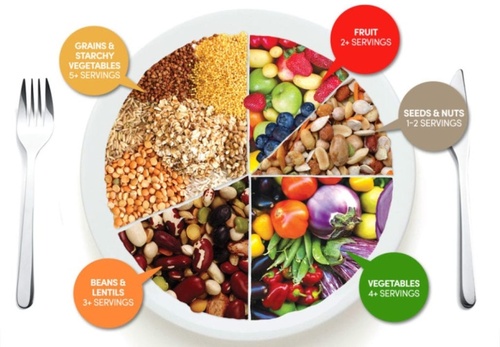

Image result for Eat a balanced diet with whole foods
A whole foods diet is a way of life versus a temporary diet. Because this lifestyle emphasizes healthy, real foods, those switching to a whole foods diet from a standard American diet high in processed foods and saturated fats may lose weight and improve their overall health.
What Is a Whole Foods Diet?
Whole foods are generally those that remain close to their state in nature. They do not have added sugars, starches, flavorings, or other manufactured ingredients. They are not primarily produced in a factory; in this way, they are the opposite of processed foods.
Because they are not manufactured, whole foods are not manipulated to be addictive like many foods containing added sugar.1 Choosing mostly whole foods will result in a nutritious diet that is naturally higher in fiber, vitamins, and minerals.
A whole foods diet is not a specific eating plan that can be tied to a particular book or expert. It may also be referred to as "eating clean," although that can imply a value judgment that a whole foods diet doesn't necessarily have. The Whole30 diet may sound similar, but that is a temporary, highly restrictive, elimination diet. Close comparisons to a whole foods diet are the flexitarian diet and TLC diet, which are healthy and balanced eating plans.
A whole foods diet is a way of life versus a temporary diet. Because this lifestyle emphasizes healthy, real foods, those switching to a whole foods diet from a standard American diet high in processed foods and saturated fats may lose weight and improve their overall health.
What Can You Eat?
A whole foods diet is not a specific eating plan and can be interpreted in many ways. In general, the idea is to favor whole foods as much as you can: potatoes instead of potato chips, grilled chicken breast instead of chicken nuggets, and so on.
When purchasing food outside the produce department or butcher and seafood counters, you will read labels and look for artificial ingredients, preservatives, and additives. Those are foods to be avoided.
What You Need to Know
While the breadth of what you can eat on a whole foods diet is surprisingly large—meat, cheese, grains, fruit, vegetables, nuts, beans, and more—there are a few tell-tale markers of foods that don't fit the bill.
For instance, many ready-to-eat foods such as frozen meals, soda, baked goods, and candy may be packed with artificial ingredients, such as coloring, preservatives, and flavorings. You'll also want to steer clear of any foods containing added sugars. Anything including an ingredient from this list of hidden sugars is not a whole food (although honey is an exception).
A gray area in a whole foods diet is meat and poultry, which often contain antibiotics and hormones. Some people may choose organic animal products only or avoid them entirely, but it's really a personal preference. Similarly, some proponents of a whole foods diet would avoid canned beans, preferring to soak dry beans and prepare them at home.
What to Eat
Fruits and vegetables
Nuts, seeds, and beans
Milk and some dairy products
Meat, poultry, and seafood
Minimally processed foods
What Not to Eat
Prepared and ready-to-eat foods
Heavily processed foods
Refined carbohydrates
Foods with added sugars
Fruits and Vegetables
In their original state, these are all whole foods. Those that are canned or frozen without additives (such as sweetened water) also retain their nutritional value. Fruit Roll-Ups, fruit drinks, and veggie chips, however, are not whole foods. Corn on the cob is a whole food, while Corn Flakes or anything that includes high fructose corn syrup or other molecules derived from corn is not.
Milk and Dairy Products
Milk is a whole food (although some would argue that only raw, unpasteurized milk is technically "whole"). Processed cheese is not. Regular cheese and yogurt are minimally processed, with the "processing" caused mainly by bacteria, molds, etc.
Minimally Processed Foods
This term refers to foods that are pre-prepared for convenience, including washed salad greens, sliced fruits, and so on. It could also include canned and frozen items, as long as they don't have additives such as sugar or salt. Also, note that some food additives are added for their nutritional benefit, such as calcium and vitamin D added to fresh-squeezed orange juice.
Refined Carbohydrates
Whole grains such as brown rice, quinoa, and barley are whole foods. Products that include refined carbohydrates or processed grains, such as puffed rice, brown rice syrup, or anything made with white flour, are not. Grinding grains into flour makes them more glycemic and eliminates their resistant starch.2
Prepared and Ready-to-Eat Foods
These could be anything from jarred pasta sauce to potato chips to cookies to deli meat—foods that are prepared in a commercial kitchen or factory and delivered to your supermarket or convenience-store shelf.
Updated on June 30, 2021
Medically reviewed by
Barbie Cervoni MS, RD, CDCES, CDN
